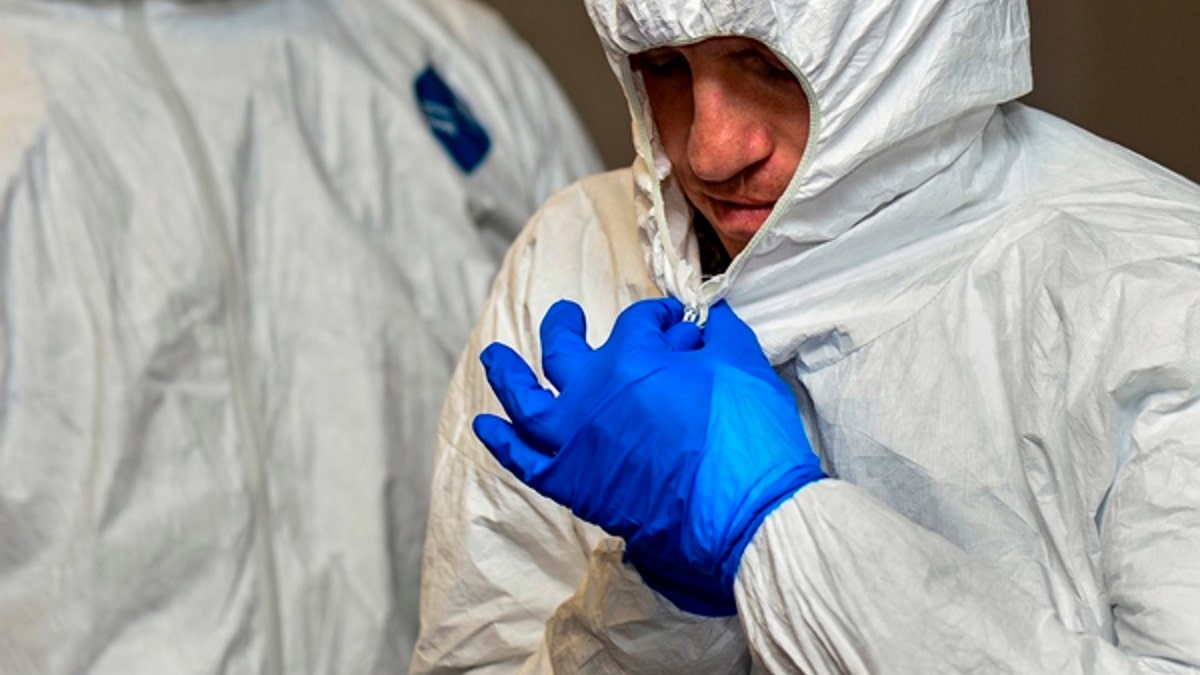
141015-F-KB808-022 (Military.com)
Fort Campbell, Ky. -- Soldiers deploying to Liberia with the 101st Airborne Division to fight the Ebola virus will be issued Tyvek hazmat suits once they arrive in country, division officials here said Tuesday.
Widely circulated media reports based on an Oct. 7 statement from Gen. David Rodriguez, U.S. Africa commander, have said soldiers would only receive items such as gloves and masks. But officials here said that just because all personal protective equipment (PPE) isn't being issued before deployment doesn't mean troops won't have them when they are needed.
"They are deploying with their protective mask, their gloves and their over-boots," said Col. Brian DeSantis, a 101st division spokesman who will be among those deploying to Liberia. "And once they get to Liberia they will receive their Tyvek suits and their latex gloves. So they're not deploying specifically with, let's call it, the off the shelf [personal protective equipment], they will receive that in theater."
The Ebola outbreak has claimed more than 4,500 lives internationally. About 700 of the approximately 1,400 U.S. service members expected to be deployed to Liberia are assigned to the 101st.
Their mission downrange will focus almost entirely on construction of 17 new Ebola treatment facilities and educating local health workers, DeSantis said.
"When you say fight, yeah it does bring up a close combat, close quarters kind of image where we are up there in close proximity," he said. "There is no mission for us to do things specifically with Ebola infected individuals. There's no mission for us to handle any remains, any medical waste. Soldiers are not going to be used in that way."
Soldiers here have received between four and six hours of training on threats specific to Liberia, such as malaria, which annually accounts for 17 percent of all deaths there, and use of hazmat suits, gloves and over-boots and masks.
The gas masks that will be used in country are the same ones soldiers train with regularly stateside.
"We're using the promask or gas mask that our soldiers are familiar with and train with on a regular basis in their Army career," said Col. Chris Warner, the 101st Division surgeon. "With Ebola you're very concerned about exposure to eyes, the nose the mouth … this is something they're familiar with, they trained with, the already have and they've already conducted extensive training with in their military career."
But most soldiers assigned to the Liberia mission have not previously used the Tyvek suits. Because of that officials said they will regularly run drills downrange practicing how to use the suit if needed.
"The Tyvek suit is something that's new for them, so there will be continued training and drills once they get to Liberia," Warner said.
DeSanits said soldiers will only wear the suits, considered "level two" protection, if they are in an environment where they could be exposed to the virus. The gear will be otherwise kept on standby.
"If you're going to be out in an area of elevated risk, potentially interacting with large crowds of people or you're not sure what the potential for exposure is, this would be a requirement to go into level two," he said. "The majority of our soldiers will stop at that point."
If service members do display Ebola symptoms they will be flown out of Liberia and to a U.S. infectious disease facility by a private government contractor, DeSantis and Warner said. Troops who are flown home for other illness or injuries will first be assessed for Ebola in country. If they are cleared to return home, they will undergo a special 21-day monitoring for the disease but otherwise go through the traditional medevac process, they said.
-- Amy Bushatz can be reached at Amy.Bushatz@monster.com





















